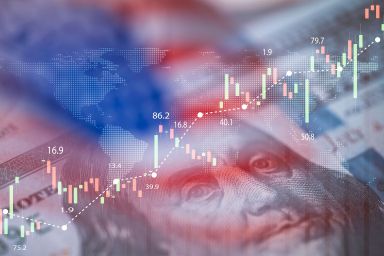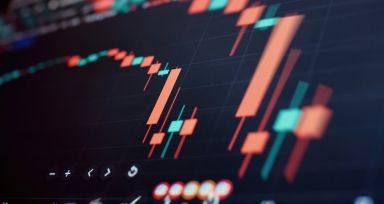Featured articles

Why Michael Burry just sold all his tech stocks
Michael Burry has just exited a nearly $100 million position on Nvidia that he opened earlier this year.
14:42, 9 October 2025

Gold forecast: Third-party price targets
Gold (XAU/USD) is currently trading at $3,982.94 (as of 6:12pm UTC, 7 October 2025), after briefly crossing $4,000 per ounce for the first time during the session.
14:43, 9 October 2025

How does Elon Musk impact cryptocurrency prices?
In cryptocurrency markets, few individuals command as much attention as Elon Musk. The CEO of Tesla and SpaceX’s tweets, Tesla and Dogecoin announcements, and public statements can trigger periods of heightened volatility, with shifts in buying and selling pressure across digital assets.
13:29, 30 September 2025

Europe’s top dividend stocks for 2025 and beyond
After several years of economic adjustment, Europe’s dividend landscape continues to reflect both stability and caution. Persistent inflation, higher borrowing costs and evolving corporate priorities have influenced how companies manage and distribute shareholder returns.
15:27, 28 November 2025

Rivian shareholders: who owns the most RIVN stock in 2025?
Rivian Automotive has attracted attention from investors worldwide since its market debut in 2021.
09:53, 28 November 2025

Most volatile Nasdaq Stock Market-listed stocks: Chinese and SaaS shares lead the volatility index
The Nasdaq Stock Market – home to many of the world’s major technology firms – often mirrors shifts in overall market risk appetite. During periods of changing monetary policy, advances in AI development and evolving corporate earnings expectations, price movements across its key constituents tend to become more pronounced.
15:03, 27 November 2025

Five things traders learned this US earnings season
S&P 500 earnings beat expectations, valuations improved, and the Magnificent Seven led the way.
14:08, 27 November 2025

Most volatile Nasdaq Stock Market-listed stocks: Chinese and SaaS shares lead the volatility index
The Nasdaq Stock Market – home to many of the world’s major technology firms – often mirrors shifts in overall market risk appetite. During periods of changing monetary policy, advances in AI development and evolving corporate earnings expectations, price movements across its key constituents tend to become more pronounced.
15:03, 27 November 2025

Five things traders learned this US earnings season
S&P 500 earnings beat expectations, valuations improved, and the Magnificent Seven led the way.
14:08, 27 November 2025

SPY, IVV and VOO: Be careful – not all S&P 500 ETFs are the same
Many ETFs aim to mirror the performance of the S&P 500, giving traders and investors exposure to the same broad market benchmark. Yet not all S&P 500 ETFs operate in the same way. Subtle differences in structure, costs and liquidity can influence how each fund performs in practice.
14:38, 24 November 2025

Markets in the Fog: Why Rate Uncertainty Still Rules the Narrative
Market volatility remains high as investors look to get further clues on what the Federal Reserve could do at the December meeting
11:29, 24 November 2025

Gold vs US dollar seasonality trends: what could be the best and worst months for traders?
Gold and the US dollar often move through familiar seasonal patterns shaped by macroeconomic cycles, fiscal factors and investor behaviour. These rhythms have tended to repeat over time, offering insight into how markets respond to broader global conditions.
09:07, 28 November 2025

Oil and the dollar: understanding crude and the USD’s inverse relationship
Oil and the US dollar share a long-standing, and often inverse, relationship that reflects the complex interplay between global trade, monetary policy, and commodity pricing.
18:25, 27 November 2025

Gold outlook: focus on rate cut odds as sentiment improves
Renewed hopes of a rate cut from the Federal Reserve drives the dollar and yields lower, allowing precious metals to regain some upside
09:33, 26 November 2025

Is gold a good investment in 2025?
Gold has long been regarded as a store of value and a potential hedge against periods of uncertainty. In the current market landscape, it continues to draw interest from both traders and long-term investors.
12:14, 24 November 2025

Gold vs US dollar seasonality trends: what could be the best and worst months for traders?
Gold and the US dollar often move through familiar seasonal patterns shaped by macroeconomic cycles, fiscal factors and investor behaviour. These rhythms have tended to repeat over time, offering insight into how markets respond to broader global conditions.
09:07, 28 November 2025

Markets in the Fog: Why Rate Uncertainty Still Rules the Narrative
Market volatility remains high as investors look to get further clues on what the Federal Reserve could do at the December meeting
11:29, 24 November 2025

10 trading tips to make the most of the Capital.com mobile app
Explore how to get the most out of the Capital.com mobile app with these practical trading tips. From managing risk and setting protective orders to using AI-driven insights and educational tools, discover how to trade more efficiently and stay informed.
09:43, 21 November 2025

US Dollar dips as odds of a rate cut increase despite strong jobs data
The delayed September US jobs data shows a picture of resilience, but markets increase the odds of a rate cut in December
14:07, 20 November 2025

Choosing a digital wallet: the top five crypto wallets for 2025 and beyond
Before choosing a crypto wallet, it helps to understand what they are and why they matter. Digital wallets aren’t just places to store cryptocurrency – they’re essential for keeping private keys safe and managing access to digital assets.
11:10, 28 November 2025

Who owns the most Bitcoin Cash in 2025: BCH holders
Bitcoin cash (BCH) was created to make everyday crypto transactions faster and more affordable, while keeping the principles of decentralisation at its core. Over the years, it has developed its own network, community and market position, distinct from bitcoin.
10:33, 28 November 2025

Who owns the most Polygon (MATIC) crypto?
Polygon has undergone several changes since its launch, expanding from a single scaling project into a broader network that connects multiple blockchains. Its native token, POL, now sits at the centre of this ecosystem, supporting everything from validator rewards to governance participation.
14:23, 24 November 2025

Top 5 meme coins by market capitalisation in 2025
Meme coins have become a distinctive segment of the cryptocurrency market, shaped by online communities and viral trends rather than traditional fundamentals.
13:49, 24 November 2025
